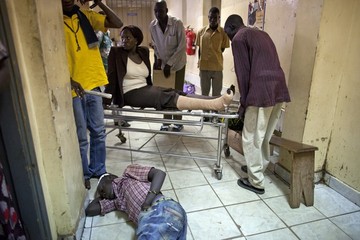Juba, Khartoum sign health cooperation agreement
May 9, 2014 (KHARTOUM) – Sudan’s health minister, Bahar Idriss Abu Garda, and his South Sudanese counterpart, Riek Gai Kok, have signed a health cooperation agreement between the two countries.

Kok, for his part underscored that the agreement would promote health work in South Sudan, pointing out that the most important characteristic of the agreement is the provision for treating southern doctors in Sudan like their Sudanese counterparts.
He disclosed that Ethiopia, Turkey, and Egypt also offered training opportunities for South Sudan’s doctors in areas of gynecology and forensics, expressing gratitude for the Sudanese people and Sudan’s government.
The two sides agreed to exchange expertise and strengthen health systems in both countries through building capacities within the available resources besides promoting trade exchange in the domain of drug supply.
They also agreed to enable South Sudan to obtain drugs and medical supplies from Sudan.
According to the agreement, Sudan would contribute to establishing laboratories for medical and pharmaceutical products in South Sudan.
The two sides further agreed to cooperate in several fields, including disaster management, medical emergencies and information exchange in times of disasters and epidemics.
The agreement also provided for coordination in areas of immunisation and combating yellow fever and communicable diseases besides establishing joint borders’ medical committees and cooperation in international medical systems.
It further provided for treatment of Sudanese medical staff who wish to work in South Sudan like their southern counterparts besides offering training opportunities in higher medical specialties for the southern medical staff in Sudan.
The two sides also agreed to grant South Sudan for training opportunities in several medical fields including cardiology, intensive care for cardiac patients, general intensive care, mental health and forensics.
It has also been agreed that Southern medical interns and registrars in Sudan will be granted provisional registration in the Sudanese Medical Council (SMC).
Sudanese government agreed to transfer skills and expertise in medical human resource development to South Sudan besides preparing plans, policies and rules regulating its work.
Sudan also agreed to help South Sudan build and establish dialysis centres in Juba and offer the necessary consultations regarding kidney diseases besides allowing southern patients to get medical services in Sudan and be treated as Sudanese citizens.
The agreement further provided for forming joint pentagonal committees to implement the agreement in accordance with the domestic circumstances in each country.
South Sudan seceded from Sudan on July 9th 2011 following a referendum on whether the semi-autonomous region should remain a part of the country or become independent. 99% of Southern voters chose independence.
(ST)
